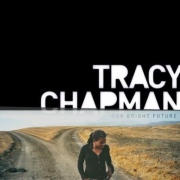 With the temperature dropping, it's time to find someone to keep you warm. Find your hookups with our online dating guide!
With the temperature dropping, it's time to find someone to keep you warm. Find your hookups with our online dating guide!
Our Bright Future
- Folk/Rock
- 2008
- Buy the CD
Reviewed by Jeff Giles
()
In Chapman’s case, this is due in part to "Fast Car’s" perfect timing – it arrived during a time in which pretty much everything in the Top 40 was programmed to death, and its lyrics struck a chord with people feeling a deepening disillusionment with the Reagan ‘80s – but also because whatever adjustments Chapman has made to her sound, her albums have always relied chiefly on the same simple core ingredients: earnest lyrics, acoustic instruments, and Chapman’s sweetly morose vocals. Like the Indigo Girls, she hit her stride early, and has rarely stumbled; that kind of consistency is admirable, but it’s also easy to take for granted.
All of which is a very long-winded way of saying that Chapman’s eighth release, Our Bright Future, offers more of the things we’ve come to expect from her – namely, gentle statements on matters political and personal, framed in tasteful folk-pop arrangements and delivered with that beautifully fragile voice. It would be tempting to call this a rut, if only Chapman didn’t fill it so well; what she lacks in eclectic impulses, she makes up for with clarity, strength, and consistency.
This time out, Chapman has teamed up with Larry Klein, a producer well-known for his ability to blend rootsy instrumentation with a slick pop touch – he’s sort of like Daniel Lanois crossed with George Massenburg – and although his presence isn’t strongly felt on Our Bright Future, it does translate to a series of impeccable, cleanly recorded performances, which is crucial for an album like this. Chapman’s voice is front and center, the guitars sparkle with crystalline warmth, clutter is kept to a minimum, and there’s a dynamic range and balance to the whole thing that’s sadly lacking from a lot of modern albums. This makes sense – Chapman’s sound has always resisted and ignored trends in equal measure – but it does raise the question of how a less commercially viable artist like Chapman can deliver an album that sounds so much better than pretty much any big-budget release of the year.
As for the songs, well, they fit squarely alongside all the other entries in the Chapman catalog – observations quietly (and sometimes pointedly) made, paeans to intelligence and compassion in a world where too many use both too rarely. Yes, it’s more of the same – but sometimes, that isn’t a bad thing at all.
You can follow us on Twitter and Facebook for content updates. Also, sign up for our email list for weekly updates and check us out on Google+ as well.











